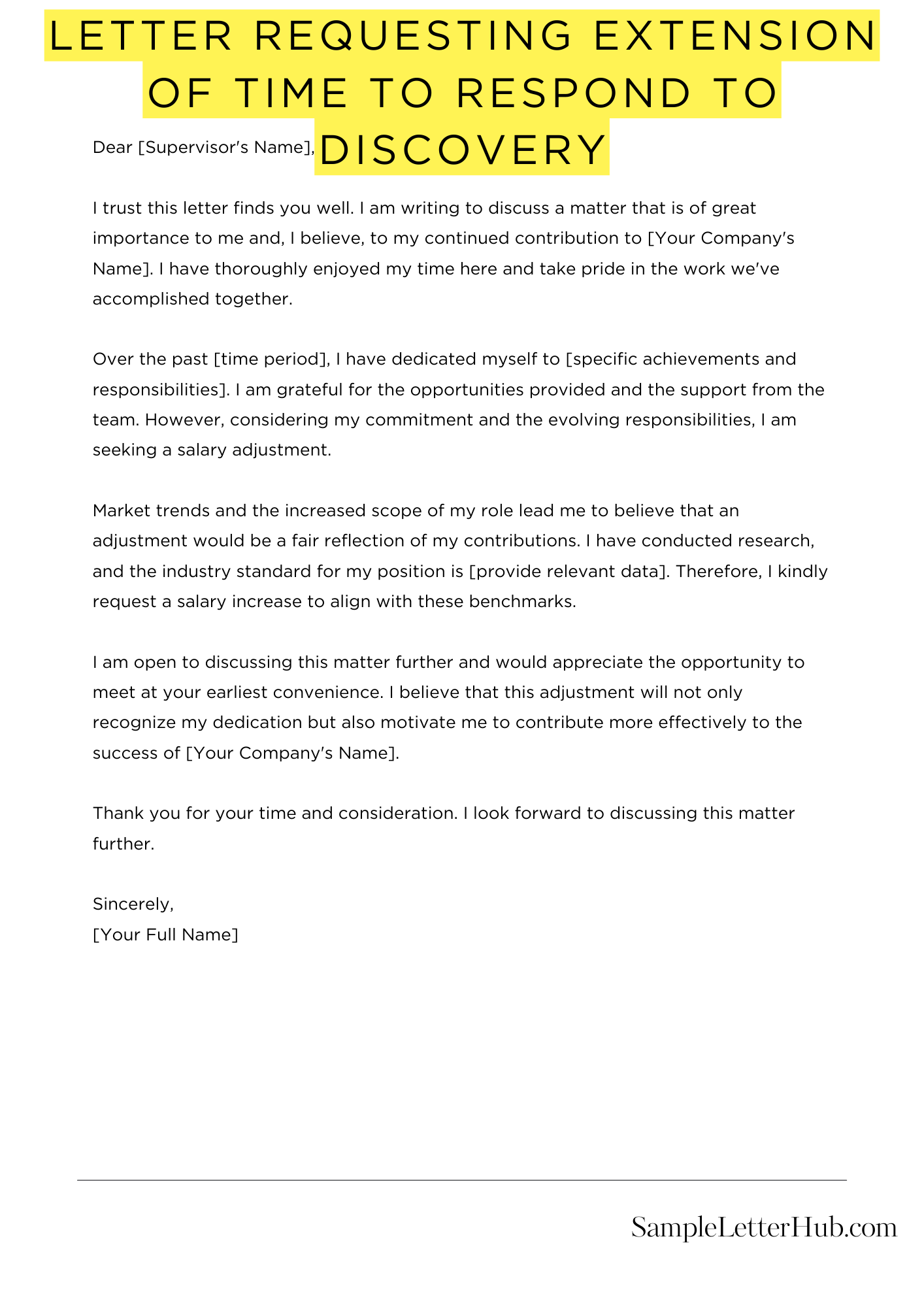A Letter Requesting Extension Of Time To Respond To Discovery is a formal request sent to the opposing counsel or the court to extend the deadline for responding to discovery requests. Discovery is the process of exchanging information between parties in a lawsuit.
In this article, we will provide you with templates, examples, and samples of Letter Requesting Extension Of Time To Respond To Discovery. These samples will help you draft a well-written letter that will increase the chances of your request being granted.
Request for Extension of Time to Respond to Discovery
Dear [Recipient Name],
I am writing to request an extension of time to respond to the discovery requests that were served on me on [Date]. The original deadline for response is [Original Deadline].
I have been diligently reviewing the discovery requests and gathering the necessary information to provide a comprehensive response. However, due to unforeseen circumstances, I am unable to meet the current deadline.
Specifically, [Explain the unforeseen circumstances that prevent you from meeting the deadline].
I understand the importance of responding to discovery requests promptly and I am committed to providing a thorough and timely response. I have already taken steps to expedite the process, but I believe that an extension of time is necessary to ensure that I can provide the most accurate and complete response possible.
I am requesting an extension of [Number] days, until [New Deadline]. This would provide me with sufficient time to gather the necessary information and prepare a comprehensive response.
I am available to discuss this matter further at your convenience and provide any additional information that may be required.
Thank you for your time and consideration.
Sincerely,
[Your Name]

How to Write Letter Requesting Extension Of Time To Respond To Discovery
When you are facing a deadline to respond to discovery, you may need to request an extension of time. This is a formal request that you make to the court, and it must be done in writing. There are specific rules that you must follow when writing this type of letter, and it is important to do so correctly in order to avoid any negative consequences.
1. State the Case Name and Number
The first thing you need to do is state the name and number of the case. This will help the court identify the case and your request.
2. State the Discovery Request
Next, you need to state the discovery request that you are responding to. This will help the court understand the context of your request.
3. State the Reason for the Extension
The most important part of your letter is stating the reason why you need an extension. You must be specific and provide details about the circumstances that are preventing you from responding to the discovery request on time.
4. State the Length of the Extension
You need to state the length of the extension that you are requesting. This will help the court determine whether or not your request is reasonable.
5. State the Proposed New Deadline
You need to state the proposed new deadline for responding to the discovery request. This will help the court understand when you plan to respond to the request.
6. Sign the Letter
Once you have completed the letter, you need to sign it. This will make it official and binding.
7. File the Letter with the Court
Once you have signed the letter, you need to file it with the court. You can do this by mailing it to the court or by filing it electronically.
By following these steps, you can write a letter requesting an extension of time to respond to discovery. It is important to do so correctly in order to avoid any negative consequences.
FAQs about Letter Requesting Extension Of Time To Respond To Discovery
What is a letter requesting an extension of time to respond to discovery?
A letter requesting an extension of time to respond to discovery is a formal request to the court to extend the deadline for responding to discovery requests. This letter is typically filed when the responding party needs additional time to gather the necessary information or documents to respond to the discovery requests.
When should I file a letter requesting an extension of time to respond to discovery?
A letter requesting an extension of time to respond to discovery should be filed as soon as possible after the responding party realizes that they will not be able to meet the original deadline. The court is more likely to grant an extension if the request is made in a timely manner.
What information should I include in a letter requesting an extension of time to respond to discovery?
A letter requesting an extension of time to respond to discovery should include the following information:
- The case name and number
- The name of the responding party
- The date of the discovery request
- The original deadline for responding to the discovery request
- The requested extension date
- The reason for the extension request
What are the grounds for requesting an extension of time to respond to discovery?
The most common grounds for requesting an extension of time to respond to discovery are:
- The responding party needs additional time to gather the necessary information or documents
- The responding party’s attorney is unavailable due to a scheduling conflict
- The responding party is experiencing a hardship that prevents them from responding to the discovery request by the original deadline
What are the consequences of failing to file a letter requesting an extension of time to respond to discovery?
If the responding party fails to file a letter requesting an extension of time to respond to discovery, the court may impose sanctions, such as:
- Striking the responding party’s pleadings
- Entering a default judgment against the responding party
- Awarding costs and attorney’s fees to the requesting party

